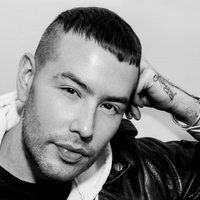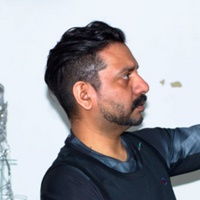On letting yourself be known
Prelude
Bill Callahan is an American singer-songwriter and guitarist who has also recorded and performed under the band name Smog. Callahan began working in the lo-fi genre of underground rock, with home-made tape-albums recorded on four track tape recorders. Later he began releasing albums with the label Drag City, to which he remains signed today. His most recent album, 2019’s Shepherd in a Sheepskin Vest, follows a six-year hiatus during which Callahan got married and experienced the birth of his first child.
Conversation
On letting yourself be known
Musician Bill Callahan on opening up, balancing a creative life with the demands of being a father and a husband, and reconnecting with his own writing practice.
As told to T. Cole Rachel, 1657 words.
Tags: Music, Creative anxiety, Inspiration, Process.
Before we start to talk about your work, I’m curious—do you like to talk about your work? Do you find interviews difficult?
Yeah. When my last album came out and I had a bunch of European interviews via Skype, they had to be early in the morning because of the time difference. I was dreading those. Every second felt excruciating, but for this record, I’ve just been… there’s no butterflies or dread. I just do the interviews. I don’t know what changed, but something changed.
What do you think it was?
I think after this record came out, I decided to stop worrying about that stuff—saying the wrong thing—and just to be more open about things. Hanly, my wife, always says honesty is the most interesting thing and it’s true. I heard this quote from the writer Harold Brodkey who said, “I don’t understand privacy.” I’ve always understood privacy very well, but it’s like—what’s the point of taking your secrets to the grave, or even your banalities? We have this chance to let ourselves be known to other people, to fill out the web of humanity that we’ve been spreading for thousands of years, and I think every little bit that people share—maybe not Instagram photos of your lunch, but other more human things—it helps. It all adds up over thousands of years of time. Why not let other people know you a little bit?
Do you find that the way that you make songs, or what function song-making has in your life, has changed from how it was when you were younger?
I think for me that’s something that has never changed. When I’m in the flow of writing, I feel like I’m working on my first record all over again. I remember how I felt, and it feels oddly, completely the same. It never changes for me, no matter what, although my life changes and my character and perspective changes, but the actual feeling and intuition I have when I’m writing… nothing about that has changed.
Are you a habitual worker? Do you have a routine around creative work, or a special studio or space that you go to?
Seven days a week I try and devote some hours to writing. It’s just like I can’t help myself. My guitar is the best drug ever. Even just picking it up and playing a note… I’m in that place and I could be there for the next 12 hours. I’m actually very disciplined in that regard. It’s the other things that take discipline, like showering and stuff.
So much of your new record is about domesticity. When you have other things in your life—like a child and a spouse—who are vying for that same time you might have previously only used for writing, how do you make room? These changes in your life have beautifully enriched your work, but it sounds like maybe it wasn’t the easiest transition.
Probably the biggest hurdle of my musical life was learning how to be a father and a husband and then also be the songwriter guy that I used to be. It’s very difficult. That’s why it took me so long to make another record. It seemed like it wasn’t going to happen for a while. For a couple of weeks I thought about just being a dad and that’s it, but I realized that suppression is not a good way to live your life.
I guess what was happening was that I was writing things, but they wouldn’t feel honest. I felt like I was writing what I was supposed to write, what a new father, a new husband, was supposed to write about. But I always know when I’m bullshitting myself, and I was. I had to try to keep saying that to myself—bullshit.
And what was the way out of that?
It took a matter of seeking out, “How do I really feel? What are all the different sides of what I’m feeling?” That’s what good writing needs—to have a hold on all of the sides at once. I was also going to therapy to help me with being a dad and husband and also being a musician and artist. Therapy helped quite a bit. I found a really good therapist, the first one who actually got me. They helped me instead of just grasping at straws, like they often seem to be doing.
It was the hugest feeling of change I’ve ever experienced. I can only compare it to my youth before I started making music. I was a huge music fan and I was trying to go to college like I was supposed to at 19 years old. I had to do lots of shitty jobs, and classes weren’t doing anything for me. That’s when I made the decision to just make music. That’s what this felt like—like I was deciding to make music again. It was that big of a milestone for me. Nothing was in my way once I got going, at age 22 or whatever I was, and started writing songs. Music was number one. I had no other real responsibilities or nothing taking up my time, so I got very used to that lifestyle of everything being about me and my music.
I never regretted getting married or starting a family. The change was very welcome to me. I never was like, “Oh, I wish I’d never done this.” I knew that. And because I’d already made 12 albums, whatever it is, I had faith that it would come back. I just needed to wait. The bigger question is always—”Do I wait and go have fun and the songs will come whenever they want? Do I take care of other responsibilities that you put off and just wait, or do I struggle every day with trying to play music until it feels right again?”
Which was the thing that finally won out? Struggle every day?
Well, it’s still hard to say. I still worked pretty much six days a week—or seven when I could—and I got a few little scraps of lines and things that I ended up using, but you don’t have a song until you have a song that you can put down and play for yourself or somebody else. Until you can do that, it’s not really a song.
I definitely used some things from that difficult period. When it all starts coming together, it always happens really fast and the things that you thought you might use, they just suddenly fit into the right places. You’re like, “Oh, that makes sense now. That’s why I kept that.”
I don’t think I’ll ever know. If I hung out every day and went swimming and went out to eat and just did all those fun things, I don’t know what would have happened. Would I have ever made a record? In the end I can’t live like that because it doesn’t feel right.
Sometimes there is that difficult push and pull between feeling like you’re trying to force something into existence that doesn’t need or want to exist, and that feeling that if you don’t at least try to facilitate this process every day, nothing may ever happen again. It’s hard.
I think you have to stay in touch with it. Even if you’re not writing poetry or a song, you should probably be reading a little bit of it. I don’t know if anybody would try the other way. Just have fun. Has anyone ever tried that? To just have fun when nothing’s happening? It’s all a part of it, I guess. The time and the thought and some of the fun stuff.
Are you looking forward to playing shows again?
I am. I’m very grateful that people care and want to hear songs from me. I’m very aware of that, how crucial that pull is—other people pulling me to come do shows. I’m looking forward to playing.
Touring becomes another complicated thing when you have family, negotiating how long you can handle being away.
Yeah. I’ll probably never do the six-week tour again. You have to try to keep things shorter. I used to tour a lot, especially around the time of Red Apple Falls. I was constantly on tour. I did that for years.
Touring and recording—that’s the never-ending life cycle for most musicians. Having a child must really break up that sort of inertia.
I always find that they compliment each other, the touring and recording. I don’t like routine. I like some routine, but it gets old and I need a new routine, which then also gets old. I find that the two extremes really nurture each other, as opposites. I get restless and frustrated not touring.
I love that there’s a song on your new record called “Writing,” about writing: “It feels good to be writing again, clear water flows from my pen. It feels good to be singing again.” It’s such a beautiful song about how it feels to make something.
It wasn’t one of the first songs that I wrote for the record, but it happened when I realized, “I got it back! I’m back.” That’s when I started finishing songs. It was a celebration of that. Simple.
Writing can be many things besides just writing, right? Looking at art, listening to music, going for a walk—it’s all part of the process sometimes.
Totally. I feel like that is true. Watching movies or even just going to a party or something, this is research. It’s all a part of it. It’s all writing, really.
Bill Callahan Recommends:
The Studs Terkel books! Just reading people’s speech, the way they talk and get an idea across and tell their life stories—it just sets something off in me. Humanity’s flame!
- Name
- Bill Callahan
- Vocation
- Musician
Some Things
Pagination



